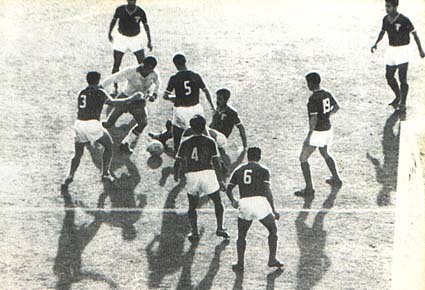Apparently Eduardo Galeano’s book sales spiked in the US last year when Hugo Chávez gave Barack Obama a copy of Open Veins of Latin America: Five Centuries of the Pillage of a Continent.
Which probably gives you a fairly accurate impression of the kind of writer Galeano is: a left wing journalist/historian with a particular anti-imperialist, anti-American emphasis. I decided to read some Galeano for the Read The World challenge — he’s Uruguayan — and considered reading one of his more political works; I could certainly stand to know more about the history and politics of Latin America. And they all get very high ratings on Goodreads and Amazon; hardly a foolproof test, but a reassuring suggestion that they’ll at least be quite readable. In the end, though, I took the soft option and bought his book on football, Soccer in Sun and Shadow. And I enjoyed it; enough to make me think of buying some more of his work.

It’s a string of hundreds of little vignettes, pen portraits, anecdotes, and mini-essays, each with it’s own heading, sometimes two or three pages long but often just a couple of paragraphs. Some are about broader subjects, like crowd violence or tactics or the commercialisation of the game; others about a particular player or game or even a single memorable goal. They’re arranged in chronological order, so they form a sort of idiosyncratic history of the game according to Eduardo Galeano.
It’s a distinctly Latin American perspective, which is probably a valuable corrective to the Anglo-centric bias of most of the football writing that I read. It does mean that some players get left out who would certainly make it into an English equivalent of this book: George Best, Paul Gascoigne, John Barnes, David Beckham. It’s a compliment to his writing that I found myself wanting to know what he would have said about them. And indeed about players who are too recent to make the cut; the book was originally published in 1998 and updated in 2003, so there’s no Ronaldinho, no Messi, no Christiano Ronaldo, no account of the current amazing Spain team.
Generally I think the book loses a bit of impetus towards the later years anyway; the earlier stuff is best. Partially I think that’s because there’s a fascination with the pre-history of football before everything was captured on film; it’s not a sport which lends itself to statistics, so reading about early football is like reading about ancient Greek painters: it doesn’t matter how detailed the descriptions are, there’s still a void at the centre of it all. It probably also has something to do with being Uruguayan; Uruguay won the Olympics in 1924 and 1928, and the World Cup in 1930 and 1950, but it has been downhill since then. So for Eduardo Galeano, born in 1940, it has been a lifetime of their glory days being behind them. Something the English are increasingly able to relate to.
He’s also not a fan of the modern game:
The history of soccer is a sad voyage from beauty to duty. When the sport became an industry, the beauty that blossoms from the joy of play got torn out by its very roots. In this fin-de-siècle world, professional soccer condemns all that is useless, and useless means not profitable. Nobody earns a thing from that crazy feeling that for a moment turns a man into a child playing with a balloon, like a bat with a ball of yarn; a ballet dancer who romps with a ball as light as a balloon or a ball of yarn, playing without even knowing he’s playing, with no purpose or clock or referee.
Play has become spectacle, with few protagonists and many spectators, soccer for watching. And that spectacle has become one of the most profitable businesses in the world, organised not for play but to impede it. The technocracy of professional sport has managed to impose a soccer of lightning speed and brute strength, a soccer that negates joy, kills fantasy and outlaws daring.
Luckily, on the field you can still see, even if only once in a long while, some insolent rascal who sets aside the script and commits the blunder of dribbling past the entire opposing side, the referee and the crowd in the stands, all for the carnal delight of embracing the forbidden adventure of freedom.
I can’t say I necessarily agree with every one of his opinions, but it was thoroughly enjoyable book; beautifully written, and with just enough politics in it to cut through all the football nostalgia.
2 replies on “Soccer in Sun and Shadow by Eduardo Galeano”
“It’s a string of hundreds of little vignettes, pen portraits, anecdotes, and mini-essays, each with it’s own heading, sometimes two or three pages long but often just a couple of paragraphs.”
All of his books that I’m familiar with (The “Memory of Fire” trilogy and “The Book of Embraces”) are written in this manner. Over the long haul, it tends to become a bit wearisome, I’ve found.
Yup, I can believe that; it certainly didn’t bother me over a couple of hundred pages of soccer nostalgia but in a longer book on a different subject it might.